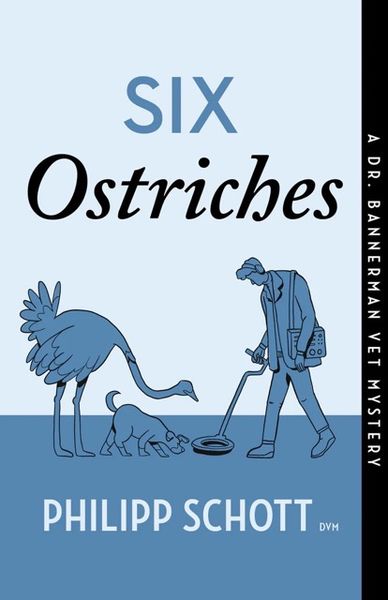Philipp Schott on Weaving Together Iceland, Ostriches, and ASD in His Newest Mystery Romp
After a long period of dominance by dark and gory Scandi-style titles, the mystery genre seems to be spreading some love to less grim aesthetics, as book lovers twig to the pleasure of reading tightly plotted whodunits that go heavy on intrigue but a little lighter on the viscera, often even injecting some humour into the mix.
So it's perfect timing for Philipp Schott's Dr. Peter Bannerman, a Canadian vet who tumbles into amateur-sleuthdom, charming readers along the way. Schott (a vet himself who puts his expertise to excellent use in his stories) started building the good doctor's world of funny, fast-paced, smart mysteries in last year's Fifty-Four Pigs, and returns this spring with Six Ostriches: A Dr. Bannerman Vet Mystery (ECW Press).
Set in rural Manitoba, the action kicks off when one of the titular birds, a resident of a exotic animal farm, swallows what turns out—when carefully removed by Dr. Bannerman—to be an ancient Viking artifact. Several local animal killings follow, and the doctor, with his sniffer dog Pippin, go to work connecting the artifact, the slayings, and a disturbing infiltration of white supremacists in the area. Their investigation ends up putting a target on both their backs, meaning Bannerman is caught in a race to prove who's behind things with his and his beloved dog's lives in the balance.
Tense enough to keep readers invested and fun enough to keep the story and Schott's charming cast appealing on every page, it's a book we're excited to be talking about today with Schott as part of our Long Story interview series for novelists.
He tells us about the fictional town he created for Dr. Bannerman as a "sandbox for [Schott's] imagination" and its real-life counterpart, why his favourite character in the series happens to have four legs, and why he felt it was important, in this second instalment, to make Dr. Bannerman's autism diagnosis explicit.
Open Book:
Do you remember how your first started this novel or the very first bit of writing you did for it?
Philipp Schott:
I started Six Ostriches when I ran across a reference to the revival of the ancient pagan Norse religion in Iceland. I read about this and then, bizarrely, the image of an ostrich came into my head, despite the fact that Iceland and ostriches could hardly have less to do with each other. But my protagonist, Dr. Peter Bannerman, is a veterinarian and he lives in an Icelandic-Canadian community, so the proverbial mental wheels began turning.
OB:
How did you choose the setting of your novel? What connection, if any, did you have to the setting when you began writing?
PS:
This is the second in a series of amateur detective novels featuring Dr. Bannerman, so the setting is unchanged from the first book, Fifty-Four Pigs. For this series I wanted to create my idealized version of a Manitoba small town. New Selfoss was born from this desire, and from my love of Gimli, the real centre of Icelandic-Canadian life on the west shore of Lake Winnipeg. New Selfoss is its fictional cross-lake rival. I have stocked it with quirky characters and created an interesting history for it. It’s a wonderful sandbox for my imagination to play in!
OB:
Did the ending of your novel change at all through your drafts? If so, how?
Your CanLit News
Subscribe to Open Book’s newsletter to get local book events, literary content, writing tips, and more in your inbox
PS:
No, it didn’t. This is my third novel (and sixth book, three are nonfiction) and the endings never change for me. Everyone’s writing process is different of course, but my novels are always born in my mind with a clear mental image of the first scene and of the last scene. Both are quite vivid and detailed for me. Writing is then mostly a process getting the characters and story from that first part, across the wide unknown middle, to the last part.
OB:
Did you find yourself having a "favourite" amongst your characters? If so, who was it and why?
PS:
When I started this series, it was the main character, Dr. Peter Bannerman, who is in some ways an “extreme” version of me. I took some of my habits and traits and amplified them. He was the autistic version of me. But as I wrote Fifty-Four Pigs, and then Six Ostriches and Eleven Huskies (out in 2024), it became clear that my true favourite was Pippin, Peter’s sniffer dog. And he’s the readers’ favourite too. I don’t apologize for making Pippin perfect. Perfect people may not exist, but there are plenty of perfect dogs out there. Not only is he the perfect dog, but there’s something about how he’s always above the fray and not involved in the pettiness and cruelty of being human that makes him such an appealing character to have in a murder mystery. He’s a real dog though. He doesn’t talk or have super-powers (other than a tremendously talented nose), and he is in many ways a minor character. But he’s inarguably the favourite.
OB:
If you had to describe your book in one sentence, what would you say?
PS:
An ostrich swallows a Viking artefact, setting veterinarian and amateur sleuth, Dr. Peter Bannerman, on the trail of shadowy extremists and, ultimately, gruesome murder.
OB:
Did you do any specific research for this novel? Tell us a bit about that process.
PS:
I did a lot of research on the resurgence of interest in Norse religion, and specifically how that community is split between a more modern inclusive faction, and much narrower one that flirts with white supremacist ideology. In conjunction with this, I spent some time looking at how extremist groups operate on the margins of the internet. A happier research subject was ostrich medicine. I am a veterinarian, and I see many species, but I have only once seen an ostrich as a patient, and that was very briefly when I was a student. It was fun getting up to date on these fascinating and, to be honest, scary creatures.
OB:
What was the strangest or most memorable moment or experience during the writing process for you?
PS:
It’s difficult to pick just one, but when I think back now, the moment that stands out for me is when I decided to “out” Peter as being on the autism spectrum. I had deliberately not stated it overtly in Fifty-Four Pigs. I didn’t want to make a big deal about it. I wanted to present neurodiversity as integral to the human experience and not necessarily needing a label. While many readers figured it out, some did not and consequently misinterpreted some of his actions. That prompted me to drop a mention in Six Ostriches for those who may not be familiar with all the different ways ASD can present. It’s important to me for Peter to be viewed as a sympathetic character despite being, well, different.
_____________________________________________
Philipp Schott was born in Germany and grew up in Saskatoon. He now lives in Winnipeg, where he practices veterinary medicine, writes, and shares a creaky old house on the river with his wife, two teenagers, three cats, and a dog. His first book, The Accidental Veterinarian, was a bestseller and was translated into five languages.





